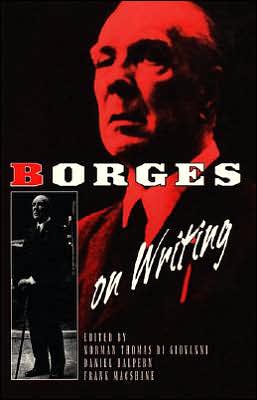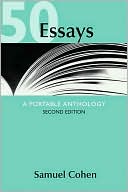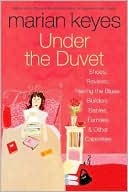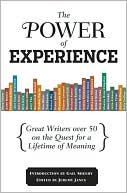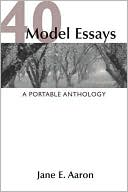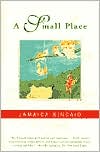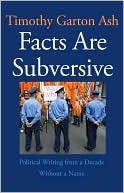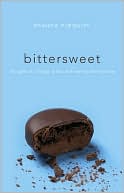Borges on Writing
Borges On Writing\ In 1971, Jorge Luis Borges was invited to preside over a series of seminars on his writing at Columbia University. This book is a record of those seminars, which took the form of informal discussions between Borges, Norman Thomas di Giovanni—his editor and translator, Frank MacShane—then head of the writing program at Columbia, and the students. Borges's prose, poetry, and translations are handled separately and the book is divided accordingly.\ The prose seminar is based...
Search in google:
Borges On WritingIn 1971, Jorge Luis Borges was invited to preside over a series of seminars on his writing at Columbia University. This book is a record of those seminars, which took the form of informal discussions between Borges, Norman Thomas di Giovanni—his editor and translator, Frank MacShane—then head of the writing program at Columbia, and the students. Borges's prose, poetry, and translations are handled separately and the book is divided accordingly.The prose seminar is based on a line-by-line discussion of one of Borges's most distinctive stories, "The End of the Duel." Borges explains how he wrote the story, his use of local knowledge, and his characteristic method of relating violent events in a precise and ironic way. This close analysis of his methods produces some illuminating observations on the role of the writer and the function of literature.The poetry section begins with some general remarks by Borges on the need for form and structure and moves into a revealing analysis of four of his poems. The final section, on translation, is an exciting discussion of how the art and culture of one country can be "translated" into the language of another.This book is a tribute to the brilliant craftsmanship of one of South America's—indeed, the world's—most distinguished writers and provides valuable insight into his inspiration and his method.
Chapter One\ Fiction\ \ The fiction seminar was based on the text of Borges' story "The End of the Duel."\ The End of the Duel\ It's a good many years ago now that Carlos Reyles, the son of the Uruguayan novelist, told me the story one summer evening out in Adrogue. In my memory, after all this time, the long chronicle of a feud and its grim ending are mixed up with the medicinal smell of the eucalyptus trees and the babbling voices of birds.\ We sat talking, as usual, of the tangled history of our two countries, Uruguay and the Argentine. Reyles said that probably I'd heard of Juan Patricio Nolan, who had won quite a reputation as a brave man, a practical joker, and a rogue. Lying, I answered yes. Though Nolan had died back in the nineties, people still thought of him as a friend. As always happens, however, he had his enemies as well. Reyles gave me an account of one of Nolan's many pranks. The thing had happened a short time before the battle of Manantiales; two gauchos from Cerro Largo, Manuel Cardoso and Carmen Silveira, were the leading characters.\ How and why did they begin hating each other? How, after a century, can one unearth the long-forgotten story of two men whose only claim to being remembered is their last duel? A foreman of Rcyles' father, whose name was Laderecha and "who had the whiskers of a tiger," had collected from oral accounts certain details that I transcribe now with a good deal of misgiving, since both forgetfulness and memory are apt to be inventive.\ Manuel Cardoso and Carmen Silveira had a few acres of land that bordered each other. Like the roots of otherpassions, those of hatred are mysterious, but there was talk of a quarrel over some unbranded cattle or a free-for-all horse race in which Silvetra, who was the stronger of the two, had run Cardoso's horse off the edge of the course. Months afterward, a long two-handed game of truco of thirty points was to take place in the local saloon. Following almost every hand, Silveira congratulated his opponent on his skill, but in the end left him without a cent. When he tucked his winnings away in his money belt, Silveira thanked Cardoso for the lesson he had been given. It was then, I believe, that they were at the point of having it out. The game had its ups and downs. In those rough places and in that day, man squared off against man and steel against steel. But the on lookers, who were quite a few, separated them. A peculiar twist of the story is that Manuel Cardoso and Carmen Silveira must have run across each other out in the hills on more than one occasion at sundown or at dawn, but they never actually faced each other until the very end. Maybe their poor and monotonous lives held nothing else for them than their hatred, and that was why they nursed it. In the long run, without suspecting it, each of the two became a slave to the other.\ I no longer know whether the events I am about to relate are effects or causes. Cardoso, less out of love than out of boredom, took up with a neighbor girl, La Serviliana. That was all Silveira had to find out, and, after his manner, he began courting her and brought her to his shack. A few months later, finding her in the way, he threw her out. Full of spite, the woman tried to seek shelter at Cardoso's. Cardoso spent one night with her, and by the next noon packed her off. He did not want the other man's leavings.\ It was around that same time, just before or just after La Serviliana, that the incident of Silveira's sheepdog took place. Silveira was very fond of the animal, and had named him Treinta y Tres, after Uruguay's thirty-three founding fathers. When the dog was found dead in a ditch, Silveira was quick to suspect who had given it poison.\ Sometime during the winter of 1870, a civil war broke out between the Colorados, or Reds, who were in power, and Aparicio's Blancos, or Whites. The revolution found Silveira and Cardoso in the same crossroads saloon where they had played their game of cards. A Brazilian half-breed, at the head of a detachment of gaucho militiamen, harangued all those present, telling them that the country needed them and that the government oppression was unbearable. He handed around white badges to mark them as Blancos, and at the end of his speech, which nobody understood, everyone in the place was rounded up. They were not allowed even to say goodbye to their families.\ Manuel Cardoso and Carmen Silveira accepted their fate; a soldier's life was no harder than a gaucho's. Sleeping in the open on their sheepskin saddle blankets was something to which they were already hardened, and as for killing men, that held no difficulty for hands already in the habit of killing cattle. The clinking of stirrups and weapons is one of the things always heard when cavalry enter into action. The man who is not wounded at the outset thinks himself invulnerable. A lack of imagination freed Cardoso and Silveira from fear and from pity, although once in a while, heading a charge, fear brushed them. They were never homesick. The idea of patriotism was alien to them, and, in spite of the badges they wore on their hats, one party was to them the same as the other. During the course of marches and counter marches, they learned what a man could do with a spear, and they found out that being companions allowed them to go on being enemies. They fought shoulder to shoulder and, for all we know, did not exchange a single word...\ Borges On Writing. Copyright © by Jorge Luis Borges. Reprinted by permission of HarperCollins Publishers, Inc. All rights reserved. Available now wherever books are sold.
